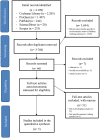Association between poverty and children's working memory abilities in developing countries: a systematic review and meta-analysis
- PMID: 37252247
- PMCID: PMC10213742
- DOI: 10.3389/fnut.2023.1067626
Association between poverty and children's working memory abilities in developing countries: a systematic review and meta-analysis
Abstract
Introduction: Working memory is critical in cognitive skills, especially among children. Children's ability to count and complete cognitive tasks are strongly associated with working memory abilities. Recent studies indicated that in addition to health factors, socioeconomic status also has a significant impact on children's working memory capacity. Despite these, evidence on the effects of socioeconomic status on working memory from developing countries yielded a somewhat puzzling picture.
Methods: This systematic review and meta-analysis provide a comprehensive summary of the recent evidence concerning the socioeconomic status determinants of children's working memory in developing countries. We searched via Cochrane library, ScienceDirect, Scopus, PubMed, and ProQuest. The initial search terms were ["socioeconomic", "socio-economic", "socioeconomic status", "socio-economic status", "income", "poverty", "disadvantaged", "disparity"] AND ["working memory", "short term memory", "short-term memory", "cognitive", "achievement", "performance"] AND ["child*", "school child*"]. Odds ratio (for categorical outcome data) or standardized mean differences (for continuous data) and their 95% confidence intervals were calculated from the data generated.
Results: This meta-analysis included five studies from 4 developing countries with a total of 4,551 subjects. Poverty was associated with a lower working memory score (OR: 3.12; 95% CI: 2.66, 3.65; p < 0.001). Another finding from 2 studies in this meta-analysis was that low mother education was associated with a lower score of working memory (OR: 3.26, 95% CI: 2.86, 3.71; p < 0.001).
Discussion: Poverty and low level of mothers' education were significant risk factors for lowering working memory among children in developing countries.
Systematic review registration: https://www.crd.york.ac.uk/prospero/, identifier: CRD42021270683.
Keywords: children; developing countries; poverty; socioeconomic status; working memory.
Copyright © 2023 Nugroho, Salimo, Hartono, Hakim and Probandari.
Conflict of interest statement
The authors declare that the research was conducted in the absence of any commercial or financial relationships that could be construed as a potential conflict of interest.
Figures




Similar articles
-
The association between socioeconomic disadvantage and children's working memory abilities: A systematic review and meta-analysis.PLoS One. 2021 Dec 2;16(12):e0260788. doi: 10.1371/journal.pone.0260788. eCollection 2021. PLoS One. 2021. PMID: 34855871 Free PMC article.
-
Small class sizes for improving student achievement in primary and secondary schools: a systematic review.Campbell Syst Rev. 2018 Oct 11;14(1):1-107. doi: 10.4073/csr.2018.10. eCollection 2018. Campbell Syst Rev. 2018. PMID: 37131395 Free PMC article.
-
Maternal work and child-care strategies in peri-urban Guatemala: nutritional effects.Child Dev. 1991 Oct;62(5):954-65. doi: 10.1111/j.1467-8624.1991.tb01582.x. Child Dev. 1991. PMID: 1756668
-
Research progress on the relationship between fine motor skills and academic ability in children: a systematic review and meta-analysis.Front Sports Act Living. 2025 Jan 9;6:1386967. doi: 10.3389/fspor.2024.1386967. eCollection 2024. Front Sports Act Living. 2025. PMID: 39850871 Free PMC article.
-
Impact of summer programmes on the outcomes of disadvantaged or 'at risk' young people: A systematic review.Campbell Syst Rev. 2024 Jun 13;20(2):e1406. doi: 10.1002/cl2.1406. eCollection 2024 Jun. Campbell Syst Rev. 2024. PMID: 38873396 Free PMC article. Review.
Cited by
-
Association between poverty, low educational level and smoking with adolescent's working memory: cross lagged analysis from longitudinal data.Front Public Health. 2024 Mar 25;12:1341501. doi: 10.3389/fpubh.2024.1341501. eCollection 2024. Front Public Health. 2024. PMID: 38590808 Free PMC article.
References
Publication types
LinkOut - more resources
Full Text Sources

